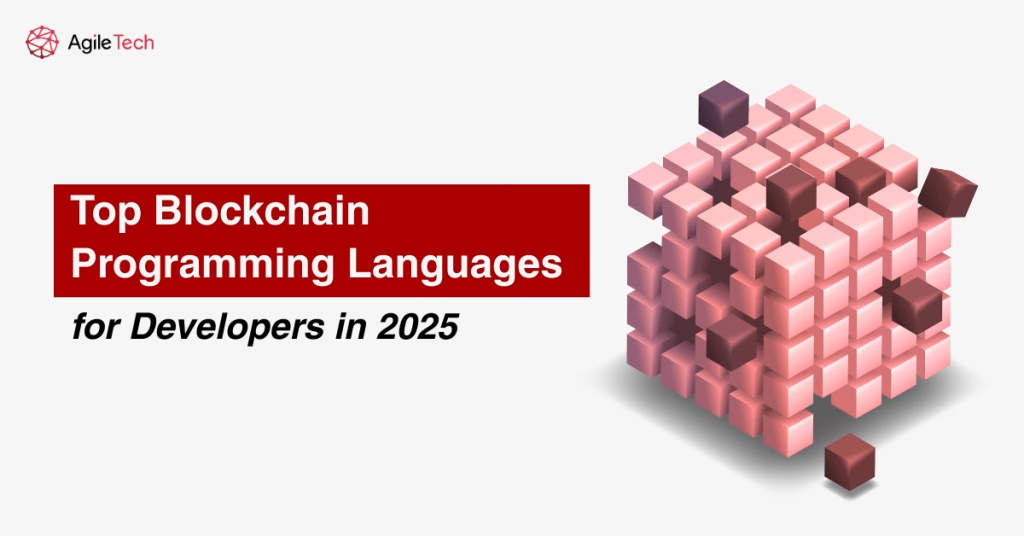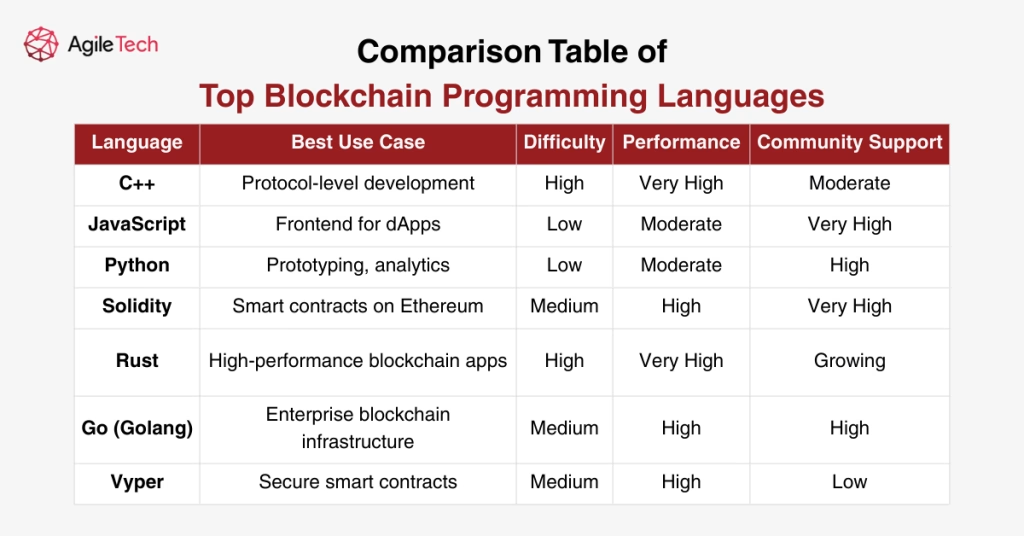Top Blockchain Programming Languages for Developers in 2025
Blockchain technology has become a transformative force across industries, from finance and supply chain to healthcare and gaming. As businesses look to implement secure, decentralized solutions, blockchain development is in high demand. One of the most critical decisions for developers and companies alike is selecting the right programming language.
This article will explore the top blockchain programming languages for 2025. Whether you’re building smart contracts, DeFi platforms, NFT marketplaces, or enterprise-grade distributed ledgers, this guide will help you understand each language’s strengths, weaknesses, and ideal applications.

- 1. C++ for Blockchain Development
- 2. JavaScript: Web-Ready Blockchain Development
- 3. Python: Rapid Prototyping and Analytics
- 4. Solidity: The Smart Contract Language for Ethereum
- 5. Rust: Secure and Performant Blockchain Development
- 6. Go (Golang): Reliable for Enterprise Solutions
- 7. Vyper: Secure Alternative to Solidity
- Conclusion
1. C++ for Blockchain Development
Overview
C++ is a legacy language in the software industry, known for its performance and system-level access. Its deterministic behavior and efficient memory management make it highly suitable for blockchain protocols.
Pros
C++ provides fast execution and allows developers to manage memory at a granular level. This is essential for blockchain systems where performance is key. It also supports multi-threading, enabling parallel processing of tasks, which helps with faster transaction speeds. Many prominent blockchain protocols like Bitcoin and EOS have used C++ due to its reliability and control over hardware-level operations.
Cons
Despite its power, C++ comes with a steep learning curve. Developers often struggle with debugging and managing complex logic structures. Additionally, C++ can be less productive than modern languages due to its verbosity and strict syntax requirements.
Use Cases
C++ is primarily used for developing core blockchain engines, writing cryptographic libraries, and powering decentralized apps that require high performance and security. It is especially favored for underlying protocol development.
Ideal For
This language is ideal for senior developers working on foundational blockchain infrastructure and performance-critical solutions that need precise memory control and high processing efficiency.
2. JavaScript: Web-Ready Blockchain Development
Overview
JavaScript is one of the most popular languages for web development and has become essential for creating user-friendly blockchain applications. Its flexibility and ecosystem support blockchain integration through tools like Node.js and Web3.js.
Pros
JavaScript is easy to learn and supported by a vast developer community. Its async capabilities allow for efficient interactions with blockchain nodes, making dApps more responsive. JavaScript also integrates seamlessly with Ethereum wallets, enhancing the user experience.
Cons
JavaScript is limited when it comes to backend or protocol-level blockchain work. It doesn’t offer advanced memory management or low-level control, which are crucial for core blockchain architecture.
Use Cases
Developers use JavaScript for creating frontend interfaces of dApps, building wallet extensions, and creating web-based cross-chain applications. It plays a critical role in improving usability and interaction within blockchain ecosystems.
Ideal For
JavaScript is perfect for web developers transitioning into blockchain and teams that focus on building intuitive user interfaces for decentralized applications.
3. Python: Rapid Prototyping and Analytics
Overview
Python is praised for its readable syntax and versatility. It is often used in blockchain development for scripting, analytics, and prototyping. Python’s growing popularity in the blockchain space stems from its ease of use and broad library support.
Pros
Python’s syntax is clean and intuitive, reducing development time. It supports powerful libraries like Pandas and NumPy for data handling. Python is also efficient for automation and scripting tasks in blockchain systems, allowing for quick iteration of ideas.
Cons
While Python is easy to learn, it’s not ideal for memory-intensive or high-speed applications. Its performance is slower compared to compiled languages like C++ or Rust, making it unsuitable for protocol-level development.
Use Cases
Python is widely used for developing smart contract prototypes, building data analytics dashboards for blockchain data, and coding automated trading bots or crypto tools.
Ideal For
It’s best suited for startups, data analysts, and teams developing MVPs or blockchain analytics solutions where development speed is crucial.
4. Solidity: The Smart Contract Language for Ethereum
Overview
Solidity was developed specifically for the Ethereum blockchain and is the most widely used language for writing smart contracts. Its syntax is similar to JavaScript and C++, easing the transition for experienced developers.
Pros
Solidity is purpose-built for the Ethereum Virtual Machine (EVM), enabling developers to write robust, complex contracts. It has a well-documented ecosystem and is supported by tools like Hardhat and Truffle that streamline development and testing.
Cons
Solidity is prone to vulnerabilities if not written carefully. Regular updates in the Ethereum ecosystem can also lead to compatibility challenges. Writing secure smart contracts requires extensive experience.
Read more: How To Build a Blockchain Application in 2025: A Step-by-Step Guide
Use Cases
Developers use Solidity to create decentralized finance (DeFi) platforms, NFT marketplaces, DAO structures, and token-based ecosystems on Ethereum and EVM-compatible chains.
Ideal For
Blockchain engineers and developers focused on the Ethereum ecosystem who aim to build dApps requiring complex contract logic and wide user adoption.
5. Rust: Secure and Performant Blockchain Development
Overview
Rust is gaining popularity in the blockchain world for its focus on memory safety, speed, and concurrency. It powers several next-generation blockchain platforms like Solana and Polkadot.
Pros
Rust guarantees memory safety without a garbage collector. It excels in concurrency, making it suitable for building scalable and efficient blockchain platforms. Its strict compiler catches bugs early, improving reliability.
Cons
Rust is challenging to learn and has a smaller developer pool compared to mainstream languages. Its advanced concepts can slow down onboarding for new developers.
Use Cases
Rust is used for smart contract development on Solana, building blockchain frameworks with Substrate, and creating fast cross-chain bridges and validators.
Ideal For
Experienced developers creating performant, scalable decentralized applications or working on layer-1 blockchain infrastructure.
6. Go (Golang): Reliable for Enterprise Solutions
Overview
Go, developed by Google, is known for its simplicity and efficiency. It’s commonly used in enterprise-grade blockchain platforms due to its concurrency model and fast compilation.
Pros
Go offers built-in concurrency and rapid execution, which are valuable for blockchain node development. It supports modular and scalable architectures, ideal for distributed systems. Documentation and community support are strong.
Cons
Golang lacks some advanced features like generics (recently added in newer versions) and has limited blockchain-specific tools compared to languages like Solidity.
Use Cases
It is used in projects like Hyperledger Fabric and Cosmos SDK for building permissioned blockchains and backend services of decentralized apps.
Ideal For
Enterprise developers and teams building consortium blockchains or private ledgers that demand reliability and modular design.
Read more: Top 10 Blockchain Development Companies in Vietnam: A Detailed List
7. Vyper: Secure Alternative to Solidity
Overview
Vyper is a newer programming language developed for the Ethereum Virtual Machine. It emphasizes security and simplicity, making it suitable for sensitive smart contracts.
Pros
Vyper avoids complex language features to enhance readability and security. It discourages patterns prone to vulnerabilities, which helps during audits and long-term maintenance.
Cons
The language is still maturing with fewer tools and limited community support. It lacks some features of Solidity, which can limit flexibility in advanced applications.
Use Cases
Vyper is ideal for smart contracts where security is the highest priority, such as DeFi protocols, DAO voting systems, and treasury management contracts.
Ideal For
Developers are prioritizing transparency and safety in contract execution, particularly in financial or governance-related blockchain applications.

Conclusion
Choosing the right blockchain programming language can significantly influence the efficiency, scalability, and security of your application. C++ and Rust offer performance benefits for core blockchain infrastructure, while Solidity and Vyper dominate smart contract development on Ethereum. Python and JavaScript enable rapid prototyping and improved user experiences, and Go is perfect for enterprise-grade solutions.
The ideal choice depends on your platform, the development team’s expertise, and the complexity of your project. Staying updated with the latest languages and trends ensures your solution is built with the best tools available.
If you’re planning to build a blockchain application, AgileTech is here to help. With extensive experience in smart contracts, decentralized apps, and blockchain platform development, AgileTech provides end-to-end blockchain development services tailored to your business goals.